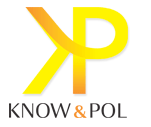Concluded Research Projects
The Significance of Knowledge in the Formation and Regulation of Health and Education Policy in Europe: Similarities and Dissimilarities Between Nations and Sectors
 What knowledge basis can political decision-makers refer to? How does the circulation of knowledge work between research institutions and politics? This is the kind of questions asked and answered in the framework of the research project “Knowledge and Policy”. The project studies the intersections of scientific expertise and political decision-making processes. It wants to provide insights into how expert knowledge from relevant branches of science enters political decision-making in the form of expert bodies, committees or ordered research. A case example examines aspects of the German health and education policy.
What knowledge basis can political decision-makers refer to? How does the circulation of knowledge work between research institutions and politics? This is the kind of questions asked and answered in the framework of the research project “Knowledge and Policy”. The project studies the intersections of scientific expertise and political decision-making processes. It wants to provide insights into how expert knowledge from relevant branches of science enters political decision-making in the form of expert bodies, committees or ordered research. A case example examines aspects of the German health and education policy.
The international research project looks for similarities and dissimilarities between the two examined fields of ‘health policy’ and ‘education policy’ and between the participating countries. Country- and sector-specific models showing possibilities of forming the cooperation between science and politics are to be traced.
Participating countries: Germany, Belgium, France, Norway, Scotland, Portugal, Hungary and Romania
Persons involved: Prof. Dr. Armin Nassehi (management), Dr. Alma von der Hagen-Demszky, Dipl.-Soz. Katharina Mayr
Duration: October 2006 - October 2011
Funded by: EU
Ethics and Organization - Clinical Ethics Committees: Structures of Ethical Decisions
The multiplication of ethics committees in various fields of society suggests two things: firstly the fact that modern society must ineluctably live with moral diversity; and secondly the fact that decisions must increasingly be taken without any secure decision-making criteria in major fields of society. The interdisciplinary research project covers theologians and sociologists. While the colleagues from theology are mainly interested in establishing how certain standards of Occidental founders can be implemented in current decision-making routines, the sociologists deal especially with working out semantic and strategic basic structures in ethic decision-making processes. In doing so, both social-theoretical and organization-theoretical questions are examined as are problems covering the transfer of scientifically founded standards to non-scientific contexts. The major subject of research will be medical ethic committees.
Further information can be found on the DFG homepage: project description and research results
Persons involved: Prof. Dr. Reiner Anselm (Göttingen), Prof. Dr. Armin Nassehi, Prof. Dr. Traugott Roser, Dr. Irmhild Saake, Prof. Dr. Michael Schibilsky (Institute of Practical Theology, LMU)
Funded by: DFG
Duration: 2002 - 2009.
Images of Death in Modern Society
Abstract: After the erosion of classical religious and other images of death, the research project will trace relevant images of death in everyday life which are assumed to possibly replace or extend the classical and traditional images of Death.
Beteiligte Personen: Prof. Dr. Armin Nassehi (Leiter), Dr. Irmhild Saake, Dr. Susanne Brüggen, Dr. Hubertus Niedermaier, Dipl.-Soz. Ursula Niesel, Prof. Dr. Georg Weber (Münster).
Gefördert von: DFG
Laufzeit: 1999 - 2001.
Research Project: Increasing Options by Productive Self-Limitation? Resilient Structures of Experimental Institutionalization
Modern societies are characterized by an increase in options for actions and a simultaneous growth of decision-making pressure.
Procedures have been lawfully institutionalized that may respond to the exponential growth of decision-making issues. The research project examines a possible change in legal forms concerning the regulation of such decision-making conflicts: Will possible “resilience reserves” of law be lost in the course of this transformation process? Or will new legal forms arise?
Under the keyword “legal self-binding mechanisms” the research project will therefore analyze changing decision-making procedures of modern societies.
Institutions may have a guiding effect on actions. Either they create specific programs and institutionalizations (“ethic commissions”) or, else, they formulate more abstract principles (“provision principle”) with which new scopes of decision-making open up for the participants.
It can be observed that actors are more and more frequently compelled to show ad-hoc responses without being able to refer to experiences. For the new decision-making situations can ever less be decided upon on the basis of experience-based knowledge.
Hence, new forms of responsibility, transparency and participation and demanded. However, such “solution portfolios” frequently turn out to be ambivalent: too much transparency can, in its turn, reduce the ability to make decisions, while too much participation may trigger disinterest in political processes.
The accompanying change in legal forms is examined in empirical terms in the framework of the research project by using ethic commissions (focusing on the field of bio-medicine) and current changes in risk management law (focusing on the regulation of chemicals) as examples.
Persons Involved: Dr. Stefan May, PD Dr. Dipl.-Ing. Stefan Böschen, Roman Thurn, M.A., Daniel Ellwanger, wiss. Hilfskraft
Funded by: Bavarian State Ministry of Research, Science and the Arts
Duration: June 1, 2013 - May 31, 2017

